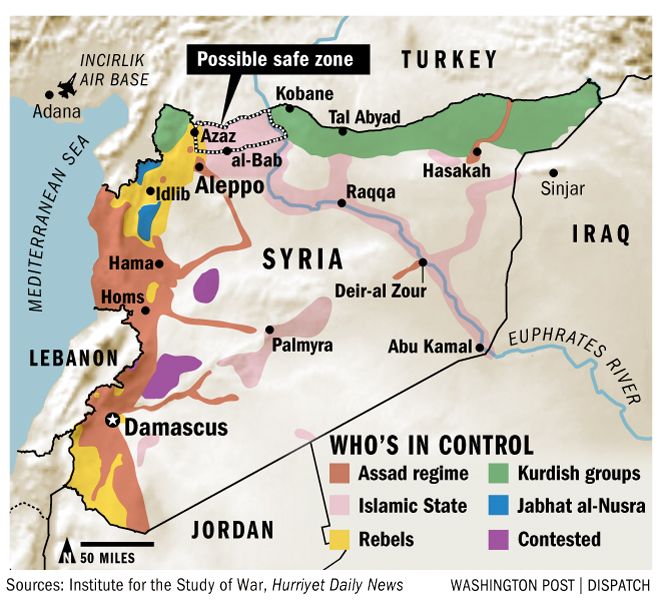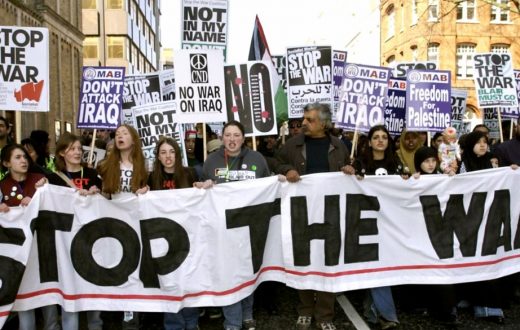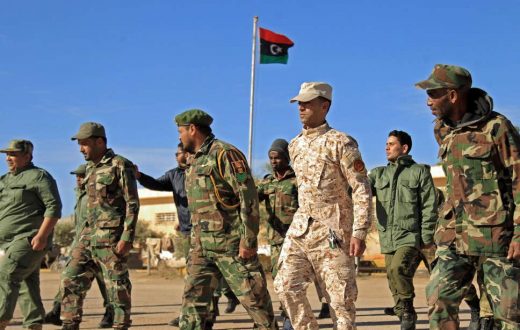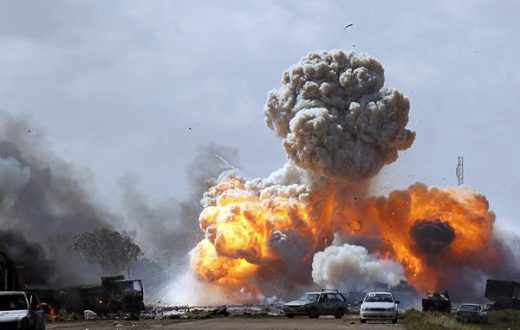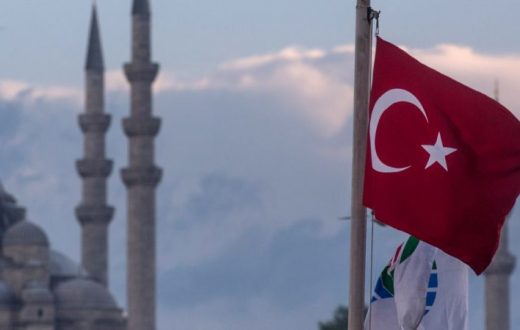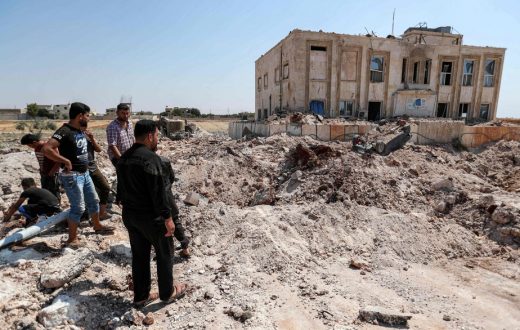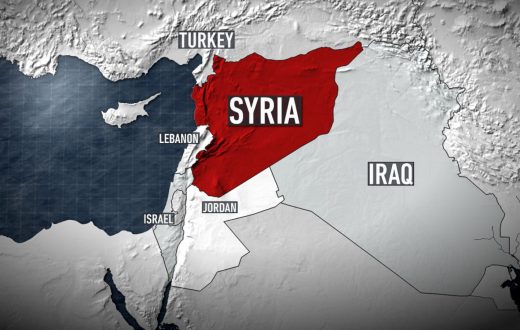Turkish President Recep Tayyip Erdogan was in Brussels on Tuesday with an ambitious agenda: to promote the establishment of a “safe zone” in northern Syria. Erdogan can see that the Europeans have no good solutions to their immigration crisis other than to manipulate the route and flow of migrants. The latest idea gaining traction in a host of European capitals is to keep the hundreds of thousands of people trying to cross the Mediterranean off of Europe’s shores by bottling them up closer to home instead. Brussels would, of course, pay Ankara to take care of its problem by housing more refugees traveling overland. But Turkey, which already hosts more than 2.5 million Syrians and has spent $7.6 billion on the refugee crisis so far, isn’t buying into Europe’s offer. Erdogan wants more. Much more.
Now that Turkey has Europe’s attention and Russia has blindsided the United States in Syria, Erdogan is attempting to use the chaotic climate to dust off his plans for a Syrian safe zone. The Turkish version of a safe zone entails reinforcing rebel forces that are friendly with Turkey to flush out the Islamic State from a zone measuring 80 kilometers (50 miles) by 40 kilometers in Syria’s northern Aleppo province. A no-fly zone, according to the Turkish proposal, would accompany the safe zone. Once the zone is declared safe and free of terrorist activity, refugee camps would be set up and Syrian migrants could live within their country’s borders again.
The motives behind Turkey’s plan are many and thickly layered. Most important, Turkey needs to avoid augmenting the burden migrants are placing on it at home while its economy is deteriorating. Second, Turkey is legitimately threatened by the Islamic State and wants to create as much distance as possible between its borders and those of the self-proclaimed caliphate. But the reasons don’t stop there. Turkey can see that its southern neighbor will be fragmented for the foreseeable future. Ankara does not want to eradicate the Islamic State only to see Kurdish forces take its place. Rather, it wants to establish a physical foothold in northern Syria to ensure that the Kurds cannot create a viable autonomous state that could exacerbate Turkey’s own Kurdish problem at home.
There is also a broader objective framing Turkey’s strategy. A divided Syria undoubtedly creates risk, but it also presents an opportunity for Turkey to expand its sphere of influence in the Levant. This is the main driver behind Turkey’s campaign to topple Syrian President Bashar al Assad’s government and replace it with a Sunni Islamist-led administration that takes its cues from Ankara. After all, someone would have to provide security to make the zone in northern Syria “safe”; Turkish forces and civilian personnel presumably would take the lead in reinforcing such a corridor, potentially placing Turkish boots back on Arab soil.
Meanwhile, there is a murkier motive to consider. Turkey’s ruling Justice and Development Party will enter the Nov. 2 elections with a low chance of winning enough votes to regain its majority in parliament. The likelihood of the elections resulting in another hung parliament, coupled with Erdogan’s reluctance to share power, raises the potential (albeit in an extreme scenario) for Turkey to use the premise of a military operation in Syria to stave off a third round of elections.
But Russia is botching Turkey’s plans. Russia, Turkey and NATO are still arguing over whether two alleged Russian violations of Turkish airspace near the Syrian border were intentional (as Turkey and NATO claim) or accidental (as Russia insists they were). Russian Deputy Defense Minister Anatoly Antonov said Tuesday that Russia was ready to form a working group and that it would be pleased to host Turkish Defense Ministry officials in Moscow to avoid further misunderstandings in Syria. Ankara has no choice but to interpret Russia’s actions as a signal that Moscow is willing to interfere in a Turkish-led safe zone if Ankara tries to push ahead with its plans.
Moscow’s strategy has already begun to bear fruit. The European officials who met with Erdogan in Brussels listened politely to his ideas for a safe zone and promised to discuss the idea further. But no European power wants to risk getting mixed up with a brazen Russia on the Syrian battlefield. The Europeans would rather bargain with Erdogan on issues such as visa liberalization for Turkish citizens and Turkey’s acceptance of more migrants on the Continent’s behalf instead.
The United States has kept Turkey’s safe zone plan at arm’s length for similar reasons. However, Russia’s military adventurism in Syria is accelerating U.S. plans for a rebel offensive that could still at least partially fit with Turkey’s interests.
In the coming months, the United States will be focused on the areas east and west of the Euphrates River. To the east, the United States will ramp up its support for Kurdish forces and their allies in preparation for a move toward Raqqa against the Islamic State. Greater U.S. support for Kurdish forces will not please Turkish leaders, but the United States’ simultaneous boost in aid for the rebels Turkey has been preparing to the west will. Here, the United States and Turkey will work together to try to carve out a border zone free of the Islamic State’s presence. The Americans are avoiding the label of a safe zone to keep the operation from conflating with Turkey’s more ambitious agenda. Nonetheless, the United States will be indirectly taking the first crucial steps toward Turkey’s ultimate goals for northern Syria.
Of course, Turkey will still have to contend with Russia. Moscow will do whatever it can to play off the fears of the NATO alliance. If a buffer zone were established in Syria and if Turkey, a NATO member, tried to protect the airspace over the zone, who would shoot down the Russian air force in the event that it crossed into the zone? In Brussels, Erdogan reiterated that “an attack on Turkey means an attack on NATO.” But if NATO proves too afraid of the consequences of responding to Russian interference, then NATO’s credibility will have been dealt a major blow. And that is exactly the outcome the Russians are hoping for.

